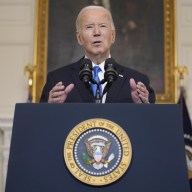Fay D. Hill remembers a time when Springfield Park was rundown, full of dog waste and dumped garbage — where abandoned cars and guns were pulled out of the dredged lake. Now the park, with planes taking off in the not-so-far distance from JFK Airport, is a picnic destination for families with strollers, cricket games and nearby factory workers on their breaks.
Hill, a retired legal secretary, had her first gardening victory growing peas in Jamaica as a child. She has lived in Springfield Gardens for the past 37 years and for her Springfield Park is now the Central Park of the outer boroughs. “It’s like an oasis, and to see the difference, now I see families walking hand in hand on the grass, having a glass of wine. That wasn’t around at the time. They used to run out of there,” Hill said. About six years ago, Hill and a small group of volunteers stepped up to beautify the 23-acre park. They added flower beds and acquired hoses to water them, instead of relying on the previous method: hauling water from the park’s lake. Through a series of workshops with Partnership for Parks, Hill learned she could reach out to her local council member for capital and discretionary funds, hold fundraisers and solicit local businesses. The partnership is a joint program between the City Parks Department and City Parks Foundation that helps community members become advocates for their local parks. Hill also started the nonprofit, Volunteers for Springfield Park.
On Saturday, Hill is co-teaching a class on Saturday at New York University School of Law on how community gardeners can fundraise for their local parks. Some 400 community gardeners are expected to attend the day-long boot camp. “It’s not difficult, but you have to work at it,” Hill said of the fundraising process.
Hill started the nonprofit because the independent funds can bypass the procurement and bidding process at the parks department. Hill said she’s raised $500,000 in capital funds from Councilmember Donovan Richards, and more than $10,000 in other funds the park otherwise wouldn’t have received. Heather Lubov, executive director of the City Parks Foundation, a nonprofit that provides programming for city parks, said the parks department budget has decreased from 1.6 percent of the city’s budget to half a percent over the last 50 years. “That means there’s just not enough money to go around for parks,” Lubov said, adding the inequity is filled by everyday New Yorkers who step up and take ownership of public spaces.
“It’s caring that’s the most important thing, and what we do is provide the skills and training that community leaders would need to do just what Fay did,” Lubov said. “It’s the old adage: teach a man to fish and he’ll eat for life, and that’s what we’re doing, making sure that as many New Yorkers as possible have the skills they need to care for their parks.” Hill said she’s looking forward to more volunteers stepping up, and holding exercise classes such as Zumba on the grounds, and getting younger people from schools involved.
“We need more young people to step up, if we don’t have a vision, we perish,” Hill said.


















